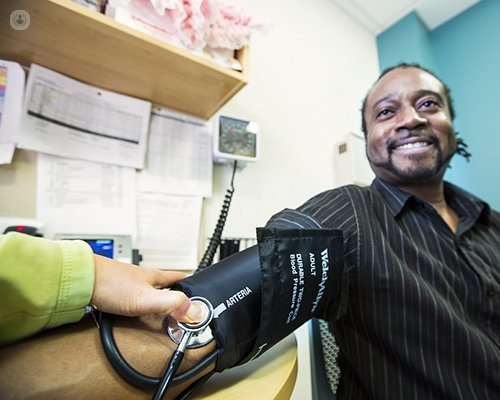Nuevos enfoques de los problemas de presión arterial
Escrito por:Hypertension, or high blood pressure doesn’t usually have noticeable symptoms. Blood pressure is recorded by the systolic pressure which is the pressure your heart pumps blood around the body, and the diastolic pressure which is the resistance to blood flow in the vessels.

High blood pressure is usually considered to be 140/90 mm Hg or higher. Ideal blood pressure is less than 130/80 and low blood pressure is below 90/60.
High blood pressure can lead to conditions such as:
- Heart disease: e.g. heart attacks or heart failure.
- Stroke
- Kidney disease and kidney failure leading to dialysis
Drug intolerant hypertension
Some patients can suffer side-effects from anti-hypertensive drugs such as nausea and severe lethargy. These patients can be challenging to manage as they are poorly understood and there is little experience of how to get around the intolerances.
Professor Lobo has formulated new medicinal approaches to these problems, such as the use of liquid formulations and patches. Following this, device therapy can be adopted for some patients.
Blood pressure monitoring
New approaches to blood pressure monitoring, include 24 hour ambulatory blood pressure monitoring, to determine if the patient is truly hypertensive, to monitor if the treatments are working, and to judge the seriousness of the hypertension.
This method is the most reliable guide to prognosis, however the traditional way of fitting the patient with a cuff can cause considerable inconvenience to patients.
To overcome this, Professor Lobo now uses a small wristwatch-like device, which is more comfortable for the patient and does not disturb sleep. This helps to give much more accurate readings.
High blood pressure – new treatments in resistant hypertension
When medication has little or no effect on the patient, the next step is to adopt novel therapeutic approaches to treatment. Clinical trials being undertaken by Professor Lobo include renal denervation, central iliac arteriovenous anastomosis, carotid sinus stimulation and carotid body ablation. These technologies are in the experimental stage, and the results are yet to be fully understood.


